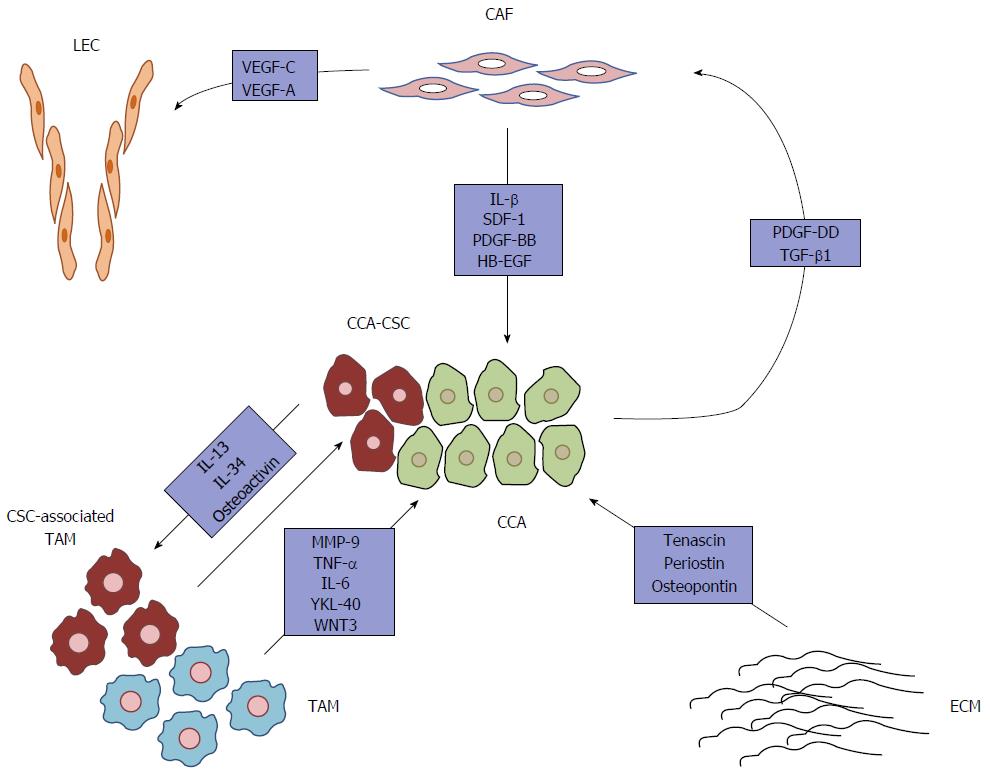©The Author(s) 2017.
World J Hepatol. Mar 28, 2017; 9(9): 455-468
Published online Mar 28, 2017. doi: 10.4254/wjh.v9.i9.455
Published online Mar 28, 2017. doi: 10.4254/wjh.v9.i9.455
Figure 1 Soluble factors derived from reactive stromal cells, along with tumor-associated extracellular matrix, sustain cholangiocarcinoma cell malignancy.
CCA cells shape the surrounding microenvironment to meet their highly demanding needs, thus providing CAFs and TAMs with the ability to secrete a broad range of cyto/chemokines, growth factors, morphogens and proteinases, which boost cancer cell proliferation, survival and invasiveness. In this model, CAFs are recruited by PDGF-DD released by CCA cells. In addition, TGF-β1, also derived by CCA cells, stimulates CAFs to produce the EGFR ligand, HB-EGF, which triggers the acquisition of malignant behaviors (i.e., EMT-like changes) by cancer cells. CAF-derived tumor-promoting molecules also include IL-1β, SDF-1 and PDGF-BB. Moreover, PDGF-DD induces CAFs to acquire pro-lymphangiogenic functions (exerted by VEGF-A and VEGF-C). On the other hand, TAMs, displaying a predominant M2 phenotype, also support tumor survival and invasiveness by secreting several soluble factors, including MMP-9, TNF-α, IL-6, YKL-40 and Wnt3. Of note, the CCA stem-like compartment molds a specific subset of TAMs (through secretion of IL-13, IL-34 and osteoactivin), displaying a mixed M1/M2 phenotype, to promote self-renewal and drug-resistance properties. In addition, non-structural proteins expressed by the abnormally remodeled ECM (tenascin, periostin, osteopontin) further enhance CCA aggressiveness. CAF: Cancer-associated fibroblast; CCA: Cholangiocarcinoma; CSC: Cancer stem cell; ECM: Extracellular matrix; LEC: Lymphatic endothelial cell; TAM: Tumor-associated macrophage; IL: Interleukin; TGF: Transforming growth factor; TNF: Tumor necrosis factor; PDGF: Platelet-derived growth factor; EGFR: Epidermal growth factor receptor; MMP-9: Matrix metalloproteinase 9.
- Citation: Brivio S, Cadamuro M, Strazzabosco M, Fabris L. Tumor reactive stroma in cholangiocarcinoma: The fuel behind cancer aggressiveness. World J Hepatol 2017; 9(9): 455-468
- URL: https://www.wjgnet.com/1948-5182/full/v9/i9/455.htm
- DOI: https://dx.doi.org/10.4254/wjh.v9.i9.455













